

Cultural transmission of tool use in bottlenose dolphins. The Forecast Calls For Spiders. What’s better than one spider?
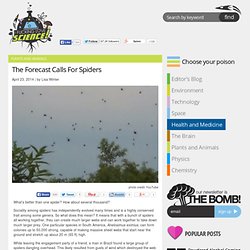
How about several thousand? Sociality among spiders has independently evolved many times and is a highly conserved trait among some genera. Ravens Keep Track of Others' Ranks. Ravens are political animals.
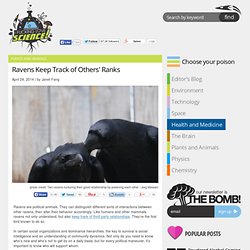
They can distinguish different sorts of interactions between other ravens, then alter their behavior accordingly. Like humans and other mammals, ravens not only understand, but also keep track of third party relationships. They’re the first bird known to do so. In certain social organizations and dominance hierarchies, the key to survival is social intelligence and an understanding of community dynamics. Not only do you need to know who’s nice and who’s not to get by on a daily basis, but for every political maneuver, it’s important to know who will support whom. To investigate this in these big brained birds, a team led by Jorg Massen from the University of Vienna, Austria, recorded audio files that contain vocal interactions between ravens and played them for a group of 16 captive ravens (Corvus corax).
Last week, we learned about cuckoos using mafia tactics, and here’s another metaphor for you. The work was published in Nature Communications this week. Crows could be the key to understanding alien intelligence. But seriously, Annalee....
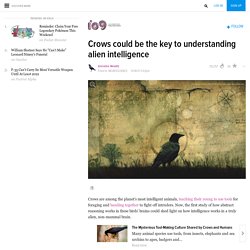
We're all ready for you to write the definitive science fiction novel about crows. In fact, you've been teasing us all far too long now :-) Write it already! Have we been dramatically underestimating elephant intelligence? Elephants Use Their Trunks to Ace Intelligence Tests. Say it ain't so, Dumbo. Elephants rely on their trunks and not those big ol' ears to find their way to food and likely to solve other puzzles, report scientists. (See: "Elephants at Risk. ") Elephants are renowned for their acute senses of hearing and smell, both of which play central roles in their everyday life. But until now, it was not known how important these senses were for basic, everyday tasks. (See: "Elephant Photo Gallery. ") "This is one of the first times, to our knowledge, that elephants were shown to use olfaction [smell] in a basic intelligence test," said Joshua Plotnik, an animal behavior scientist from the University of Cambridge, U.K., who led the study, recently published in the journal Animal Behavior.
The results of the study offer insights into how elephants think and could be used to figure out ways they might be dissuaded from raiding farmers' food, suggest the study authors. Food IQ Test Smell Surprise The findings have important implications on many levels. Alex Wissner-Gross: A new equation for intelligence. 10 Reasons an Artificial Intelligence Wouldn't Turn Evil. Awesome post..

I'm now more afraid of having my limbs chopped off, despite your skilled arguments against such a fate. Some general thoughts on the matter - I see no reason why an AI, or any set of AIs, wouldn't be susceptible to some form of irrationality, or even emotions of a very alien kind. In particular, this seems more plausible if much of the AI is assembled via evolutionary processes. Imagine an AI learning how to interact with humans via Internet discussions/comments. So It Turns Out That Monkeys Are Pretty Good At Doing Math. Can Crows Be Trained To Pick Up Litter? We’ve posted several times about corvid intelligence.
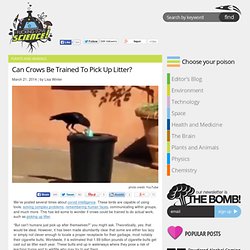
These birds are capable of using tools, solving complex problems, remembering human faces, communicating within groups, and much more. In mice, fear learned by parents is transferred to their offspring. The idea that organisms can stably inherit characteristics they acquire during their lifetimes was discarded a long time ago; the fact that it doesn't seem to happen was a big strike against the pre-Darwinian idea about evolution.
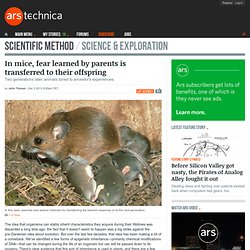
But over the last few decades, that idea has been making a bit of a comeback. We've identified a few forms of epigenetic inheritance—primarily chemical modifications of DNA—that can be changed during the life of an organism but can still be passed down to its progeny. There's clear evidence that this sort of inheritance is used in plants, and there are a few hints that it could influence significant traits in animals. Yesterday, Nature Neuroscience published a paper that provides the strongest evidence yet that an acquired trait can be passed down for several generations in mice. The paper itself inadvertently indicates just how radical this idea is. Rather than testing the mice themselves, however, the researchers decided to test their offspring. The congruence bias is why we all jump to conclusions and stay there.
The whole gateway drug thing is so flawed in so many ways.
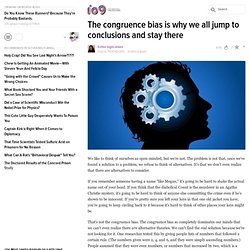
Elephant Paints An Elephant. How our brains navigate the world without us noticing. To remain oriented in a complex world, our brains constantly make and revise maps of our surroundings.
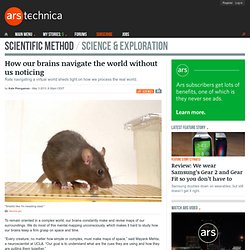
We do most of this mental mapping unconsciously, which makes it hard to study how our brains keep a firm grasp on space and time. “Every creature, no matter how simple or complex, must make maps of space,” said Mayank Mehta, a neuroscientist at UCLA. “Our goal is to understand what are the cues they are using and how they are putting them together.” To meet that goal, Mehta and his colleagues watched the brains of rats exploring a virtual reality environment and found that mental mapping relies on a wider variety of sensory input than previously thought. That’s right—they put rats in virtual reality. On The Topic of Boredom. The Science of Practice: What Happens When You Learn a New Skill.